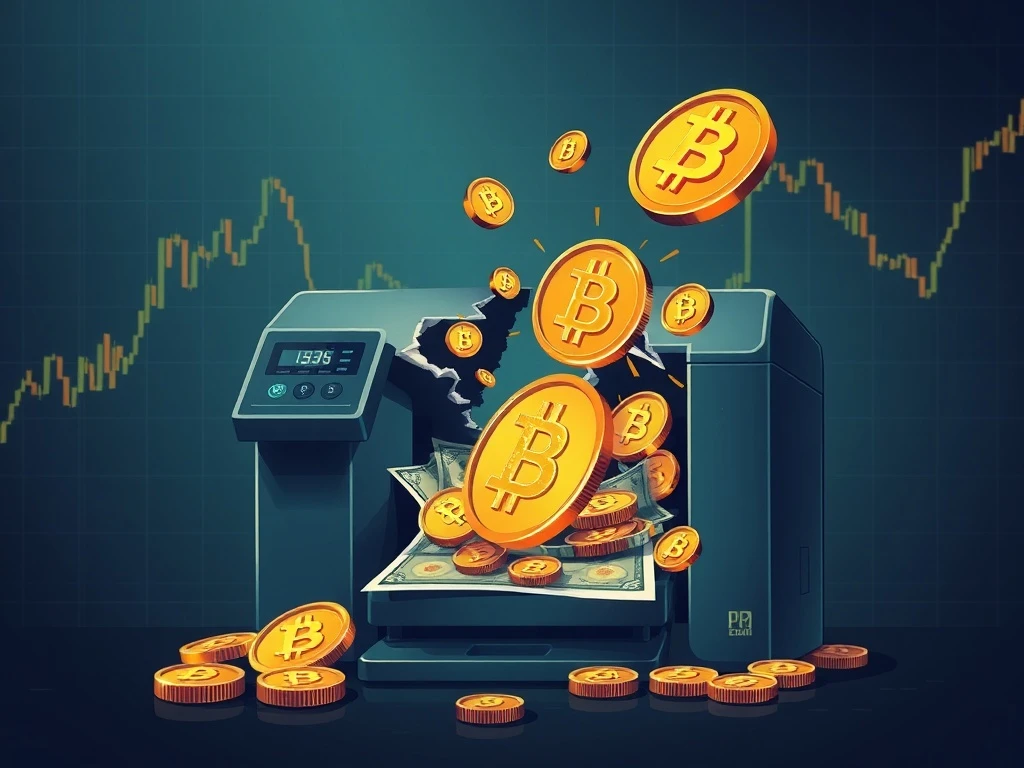Imagine a world where central banks lose control. The money printer breaks. Traditional monetary policy fails. Suddenly, Bitcoin’s value proposition becomes dramatically relevant. This scenario isn’t just theoretical—it’s a growing concern among economists and investors worldwide.
Understanding the Money Printer Mechanism
Central banks globally use quantitative easing as their primary tool. They effectively print money to stimulate economies. However, this system relies on delicate balance. When confidence erodes, the entire mechanism can collapse. Consequently, investors seek alternative stores of value.
Bitcoin’s Response to Monetary Failure
Historical patterns show Bitcoin often thrives during monetary uncertainty. The cryptocurrency operates on completely different principles than fiat systems. Its decentralized nature provides inherent protection against central bank failures. Moreover, its fixed supply contrasts sharply with unlimited fiat printing.
Key advantages during monetary breakdown:
- Decentralized verification system
- Fixed 21 million coin supply
- Global accessibility without intermediaries
- Inflation-resistant properties
Economic Scenarios and Bitcoin Performance
Different breakdown scenarios produce varied outcomes. Hyperinflation typically drives Bitcoin adoption. Deflationary spirals may initially pressure all risk assets. However, Bitcoin’s long-term trajectory remains upward during systemic failures. Institutional adoption particularly accelerates during these periods.
Comparative Asset Performance Analysis
Traditional hedges like gold have historical precedent. Yet Bitcoin offers distinct technological advantages. Its portability and divisibility exceed physical assets. Digital native characteristics make it ideal for modern financial crises. Furthermore, its verification system operates independently from failing institutions.
Regulatory and Systemic Considerations
Governments might impose restrictions during monetary crises. However, Bitcoin’s decentralized nature makes complete prohibition difficult. Existing financial infrastructure breakdown could actually accelerate Bitcoin adoption. Meanwhile, traditional asset freeze risks don’t apply to properly stored cryptocurrency.
Long-Term Implications for Global Finance
Persistent monetary system failures could fundamentally reshape finance. Bitcoin might emerge as a global reserve asset alternative. Its fixed supply protocol prevents the very printing that causes traditional breakdowns. Consequently, it represents a paradigm shift in monetary philosophy.
Practical Preparedness Strategies
Investors should consider allocation strategies before crises emerge. Dollar-cost averaging reduces timing risks. Secure storage solutions become paramount during system failures. Additionally, understanding withdrawal and conversion processes is crucial for emergency scenarios.
FAQs
What happens to Bitcoin if the dollar collapses?
Bitcoin would likely appreciate significantly as investors seek non-sovereign stores of value, though short-term volatility would increase.
Can governments shut down Bitcoin during monetary crises?
While governments can restrict exchange access, Bitcoin’s decentralized network makes complete shutdown technically challenging and unlikely.
How does Bitcoin protect against hyperinflation?
Bitcoin’s fixed supply prevents the inflationary printing that causes hyperinflation, making it an attractive hedge.
Should I move all my assets to Bitcoin?
Financial advisors recommend diversified portfolios rather than all-in approaches, even during monetary uncertainty.
How does Bitcoin perform during deflation?
Initial deflationary pressures may affect Bitcoin temporarily, but its long-term store-of-value properties typically prevail.
What technical advantages does Bitcoin have over gold?
Bitcoin offers easier transfer, divisibility, verification, and storage compared to physical gold assets.








